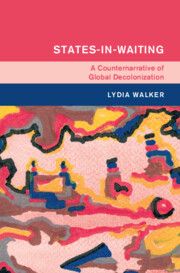‘In analyzing the history of ‘decolonization after decolonization,’ States-in-Waiting invites a salutary reconsideration of seemingly self-evident terms like ‘decolonization,’ ‘non-state actors,’ and even ‘states.’ The book's subjects range around the world and include some of the most interesting, if too-often-neglected, causes and characters of the late 20th century.’
David C. Engerman - Yale University
‘Deeply researched and written with clarity, States-in-Waiting reconstructs the transnational advocacy networks and unexpected alliances through which nationalists groups sought to realize their vision of self-determination. Focusing on the delayed and denied projects of national independence, Lydia Walker’s study is a welcome intervention that recasts the constraints, unevenness, and failures of decolonization.’
Adom Getachew - University of Chicago
‘States-in-Waiting is a fascinating account of an overlooked dimension of decolonization after the Second World War. Walker turns the spotlight on nationalist claimants within postcolonial states that sought international recognition for independent statehood and the activities of transnational advocates for their cause. Starting with the nationalist movement in postcolonial India for an independent Nagaland, this twinned history of claims-making and advocacy takes us to Zambia, Congo, Namibia. Along the way we encounter forgotten individuals of the age of decolonization-AJ Muste, Jayaprakash Narayan, Michael Scott-and institutions such as the World Peace Brigade. This brilliantly researched, carefully argued and readable book breaks new ground in the connected history of decolonization in Asia and Africa.’
Srinath Raghavan - Ashoka University
‘Historians of decolonization tend to present the moment of independence as the culmination of nationalist struggles, and the achievement of political sovereignty as a triumph. But for many ethnic, regional, religious, linguistic, and other minority groups, decolonization was a tragedy which foreclosed their political futures, leaving them as perpetual ‘states-in-waiting.’ Lydia Walker’s fine new book seeks to theorize and recover the stories of some of these groups, highlighting ‘little-known regions, marginalized individuals, hidden or lost archives,’ and the loose transnational advocacy networks which connected them.’
Brad Simpson
Source: Diplomatic History
‘… will further enrich, and complicate, our assessment of the historical possibilities that decolonization opened and foreclosed. … historically minded international lawyers will find this book greatly enjoyable and will nod at the idea that we cannot sharply distinguish between imperial orderings of the world, and post-colonial orderings. And we certainly benefit from learning that the transition from the world of European empires to a world of largely independent states was midwifed by a universe of transnational actors whose own ideological proclivities, and political priorities, do not easily map onto the lofty rhetoric of liberation that we usually associate with decolonization.’
Sannoy Das
Source: American Journal of International Law



